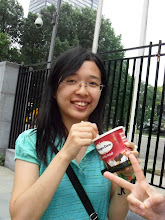Reflection =)
 Time really flies, we have come to the final blog post for ES2007S. I have really learned a lot from this module and enjoyed the process greatly. My understanding of the values of effective communication has indeed increased since the first blog post. I know how effective communication is applicable in so many areas, in our everyday interaction with people, in academics, job search and also in the workplace. From the written to oral communication, I can say I am equipped with the skills and techniques after taking this module.
Time really flies, we have come to the final blog post for ES2007S. I have really learned a lot from this module and enjoyed the process greatly. My understanding of the values of effective communication has indeed increased since the first blog post. I know how effective communication is applicable in so many areas, in our everyday interaction with people, in academics, job search and also in the workplace. From the written to oral communication, I can say I am equipped with the skills and techniques after taking this module.Working on the group project has allowed me to hone my communication skill and on building interpersonal relationship. I have gained invaluable friendships in the process. Through the project, I am also able to apply the techniques and skills of written and oral communication that I have learned in class into practice.
This module has also taught me about job search communication. Writing resume and persuasive application letter do not seem so daunting to me now. I understand how practicing effective written communication on our resume and application letter can be that crucial in enabling us to clinch that desired job. In addition, the mock interview and lists of interview questions are indeed useful. I am also able to draft business correspondents and meeting minutes. These skills are indeed very relevant in the future.
Through this module, I understand the complexity of communication better now and appreciate the importance of effective communication more. Able to practice effective communication is indeed an invaluable skill. Overall, I have gained much from this module. I am sure these skills would definitely help me in the workforce which I am going to enter soon.
 During the last school vacation, I went on a summer programme to Toronto. It was indeed an eye-opener for me as the culture between Canada and Singapore was really different. I remembered there was one time we visited a fast food restaurant over there and I asked politely for chili sauce after I noticed that chili sauce was not provided as was the norm in Singapore. The lady at the counter looked confused at what I had just said. I thought she might not have heard clearly what I had said, so I repeated my request slightly louder. Again, she can’t seem to understand. So, this time I said I wanted ‘hot sauce’, hopeful that she might understand. But again, to no avail, then I gave up, feeling a little pissed and annoyed that she cannot understand me after many repetitions. The lady looked apologetic. I returned to my seat with the tray of food without my comfort food, chili sauce. I realized ketchup and mustard seemed to be the only sauce that they ate.
During the last school vacation, I went on a summer programme to Toronto. It was indeed an eye-opener for me as the culture between Canada and Singapore was really different. I remembered there was one time we visited a fast food restaurant over there and I asked politely for chili sauce after I noticed that chili sauce was not provided as was the norm in Singapore. The lady at the counter looked confused at what I had just said. I thought she might not have heard clearly what I had said, so I repeated my request slightly louder. Again, she can’t seem to understand. So, this time I said I wanted ‘hot sauce’, hopeful that she might understand. But again, to no avail, then I gave up, feeling a little pissed and annoyed that she cannot understand me after many repetitions. The lady looked apologetic. I returned to my seat with the tray of food without my comfort food, chili sauce. I realized ketchup and mustard seemed to be the only sauce that they ate.

